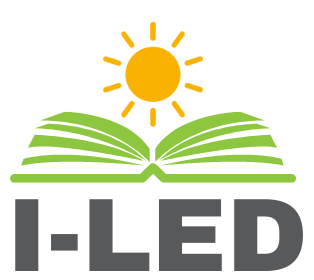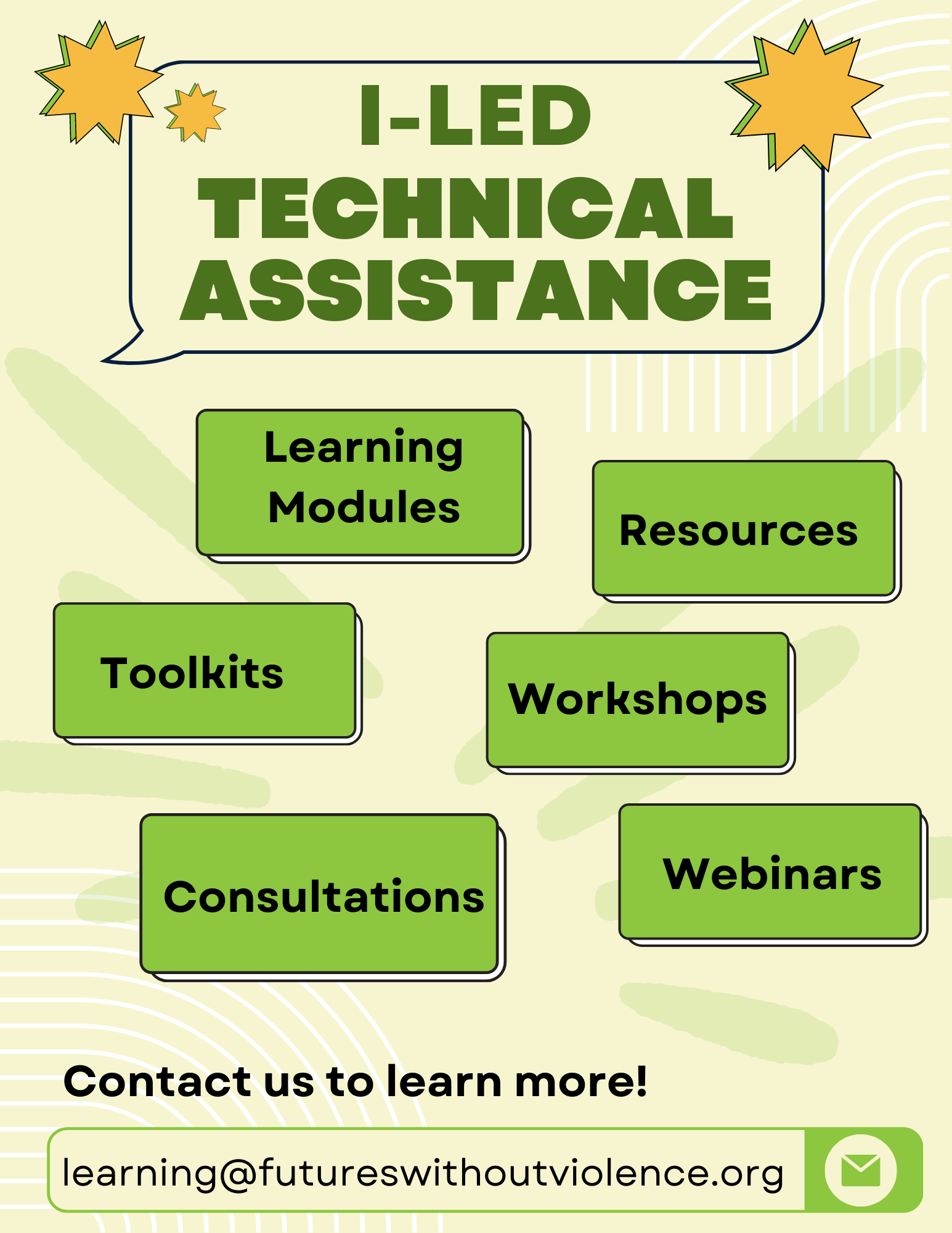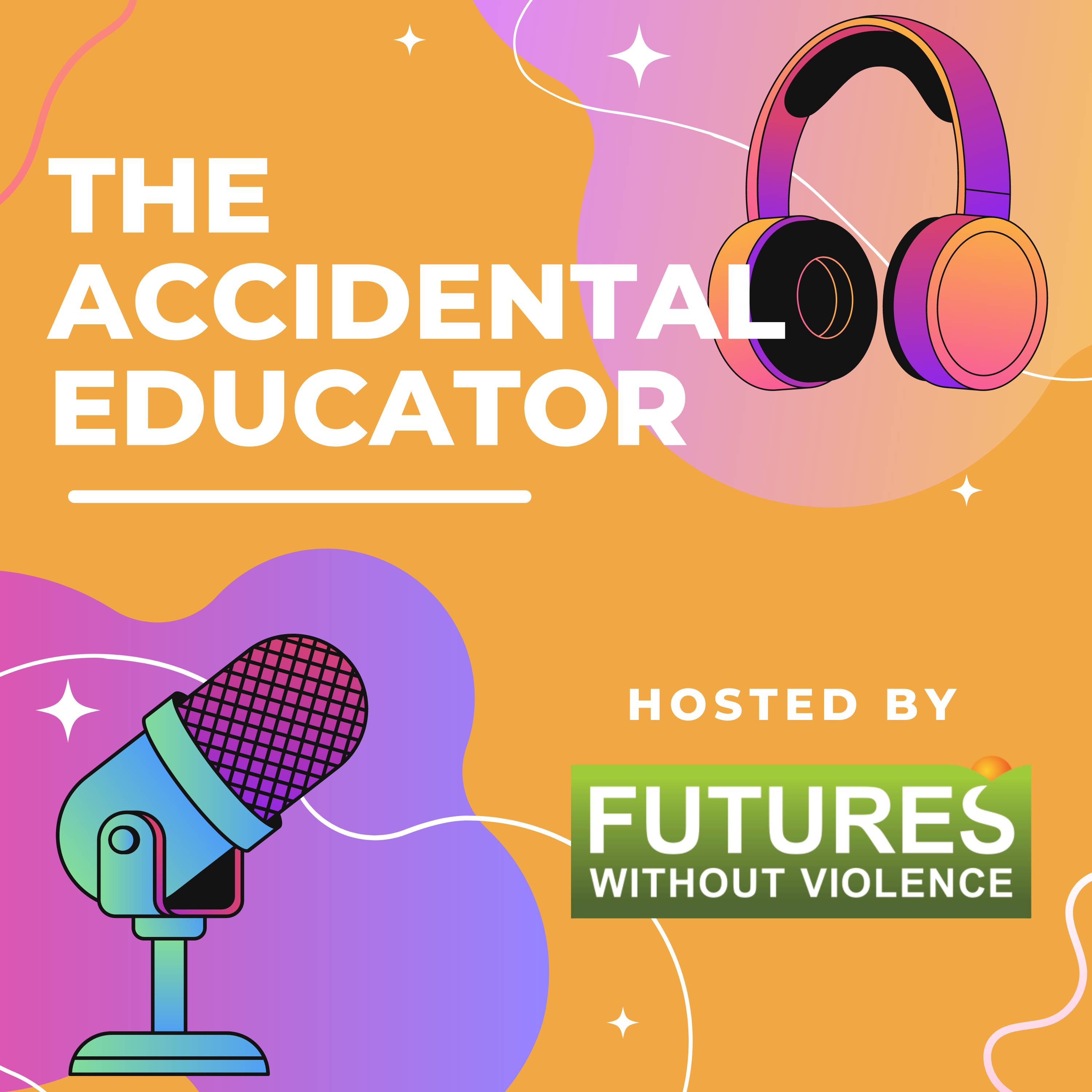Institute for Leadership in Education Development
 The Institute for Leadership in Education Development (I-LED) offers hands-on workshops and technical assistance to help US Department of Justice Office on Violence Against Women (OVW) grantees to enhance the relevance and effectiveness of training and education programs supported by OVW, and improve the capacity of OVW grantees to design and deliver well-organized, accessible, highly-interactive training and education for their constituents.
The Institute for Leadership in Education Development (I-LED) offers hands-on workshops and technical assistance to help US Department of Justice Office on Violence Against Women (OVW) grantees to enhance the relevance and effectiveness of training and education programs supported by OVW, and improve the capacity of OVW grantees to design and deliver well-organized, accessible, highly-interactive training and education for their constituents.
I-LED workshops reach national, multidisciplinary audiences of OVW grantees and their constituents, including advocates, attorneys, social workers, visitation center staff, volunteer coordinators, judges, and other professionals who engage in program design and/or faculty service.
Principles of Adult Learning
I-LED programs are all designed based on the following principles of experiential adult learning:
- Learning is a continuous process and not just a final outcome.
- All learning involves building upon previous knowledge.
- Conflict, differences, and disagreement are catalysts for learning.
- Learning requires the integration of thinking, feeling, perceiving, and behaving.
- Learning involves incorporating new experiences into existing understanding and adjusting existing understanding based on new experiences.
According to this approach, knowledge is not simply transmitted from the instructor to the learner in a one-way fashion, as is often the case in traditional education. Instead, knowledge is actively created and recreated within the learner’s personal understanding.
In-Person and Virtual Workshops
- Educational Program and Curriculum Design (EPCD) Course (6-week virtual course)
This virtual course focuses on the detailed process of conducting a needs assessment, writing learning objectives, and designing an engaging and learner-centered curriculum outline. - Faculty Development Workshop (2.5 days in-person–next offering in Fall 2025)
This workshop engages participants in the process of planning an educational program with an emphasis on learning how to facilitate effectively. Teams design their own curriculum segment and present to peers and faculty for feedback. - Effective Meeting Facilitation Skills Workshop (1.5 days in-person–next offering in Spring 2025)
This workshop is designed to enhance your meeting facilitation and decision-making process skills. From agenda development and creating inclusive and accessible environments to managing power dynamics, participants will learn techniques for navigating conflict and gain valuable insights and skills to lead effective meetings and make collaborative decisions. - Distance eLearning Course (virtual, self-paced version coming soon). This workshop focuses on assisting participants to design and deliver accessible and interactive virtual courses on a budget.
Technical Assistance
Please reach out to learning@futureswithoutviolence.org to request technical assistance and/or for more information about our upcoming trainings and TA.

Online Learning Modules
- Adult Learning Toolkit (updated version coming early 2025!)
- Language Access and Language Justice Learning Module
Podcast (NEW!)

The Accidental Educator (available on most podcast streaming platforms!)
The Accidental Educator is a podcast for advocates who want to change how we teach about gender-based violence. We invite you to experience our “How to Make a Podcast” podcast. In our first two episodes we follow our host, Abby, as she learns how to get started with pre-production and planning out the theme and content, what gear she needs, how to use audio editing platforms, and how to edit the episode into a cohesive story. We also talk with local domestic and sexual violence programs about their podcasting strategies and how they make their podcasts relevant to the communities they serve. Make sure to check out the episode’s accompanying resource guide to learn more about podcast production. In episodes 3 & 4, Abby talks with Meghna Bhat, a survivor storyteller, first generation immigrant, and gender and social justice educator. Together, Abby and Meghna dive deeper into how you can use trauma-informed storytelling in your podcast.
Online Tools
Many people who work to stop gender-based violence find themselves teaching others, even though they may not have formal training in creating educational programs. This toolkit is here to help. It offers a simple framework to create effective, learner-focused educational opportunities. Whether you’re developing workshops, entire courses, or community outreach programs, this toolkit will help you engage your audience, create meaningful learning experiences, and drive impactful change in your advocacy work.
This tool offers tips to deliver a powerful speech and drive positive change in gender-based violence prevention and community engagement.
The Accidental Educator Toolkit
Part One: Adapting Facilitation Skills from In-Person to Virtual
This tool offers virtual alternatives for common in-person activities, engagement strategies, and facilitation techniques.
Part Two: Dealing with Virtual Facilitation Challenges
This tool provides tech solutions, facilitation strategies, and content suggestions to support facilitators, or “accidental educators,” adapting to individual participant and overall group dynamic related challenges in an online format.
Eleven Steps for Designing a Multilingual Accessible Education Program
This tool gives a step-by-step guide for implementing greater language access into both in-person and virtual training events through the lens of language justice. The content is in English and Spanish.
Learning & Leadership Department Education and Training: Development and Delivery Process
This tool denotes some indicators of quality to consider when reviewing training or education materials.
Translating Your In-Person Education Online: Tips for Piecing it All Together
This tool incorporates the principles of adult learning into virtual education delivery and considerations on delivering an in-person course through e-learning.
Translating Face-to-Face to Virtual Tip Sheet
This tool provides some great tips on how to adapt traditional practices of face-to-face instruction to virtual environments.
Facilitating Support Groups Online
This tool provides resources on how to move traditional support groups online, in addition to some traditional support group resources and topics for online support groups.
This tool provides ten (10) key tech tips that can help you enhance your web-based offerings.
This page has infographics that engage andragogy and engaging in a digital space.
Webinars:
Designing Gender-based Violence Education for Older Adult Learners
This webinar covers the importance of considering the learning needs of older adults who are engaging in education on gender-based violence and provides helpful tips and learning strategies to meet the needs of this audience.
The Accidental Public Speaker: Moving Through the Anxiety to Deliver an Impactful Speech
Through interactive discussions and practical exercises, you’ll gain some of the tools you need to deliver a powerful speech and drive positive change in gender-based violence prevention and community engagement.
Leading Educational Support Groups Webinar Series / Impartición de grupos de apoyo educativo
In part one, we taught techniques to reduce anxiety, and how to facilitate group agreements and norms that promote relationship building, inclusivity, and mutual respect.
In part two, techniques were shared for designing groups based on your community’s needs and structuring lesson plans with flexible agendas to meet the unique needs of each group.
Learning Through Interactivity Webinar Series
This webinar covered the elements and theories of learning activities for both in-person and virtual settings that are best suited for adult learners.
This webinar discussed the importance and brain science of interactivity in virtual and in-person learning sessions for OVW grantees to utilize in their own work.
In part one, we delved into the history and tradition of storytelling in different cultures and the role of survivor stories utilized by DVSA and other survivor-serving organizations.
In part two, we broke down specific components of storytelling: crafting narratives, interweaving experiences and emotions in storytelling, and setting the stage for a successful story.
This project was supported by Grant No. 15JOVW-22-GK-03994-MUMU awarded by the Office on Violence Against Women, U.S. Department of Justice. The opinions, findings, conclusions, and recommendations expressed in this document are those of the author(s) and do not necessarily reflect the views of the Department of Justice, Office on Violence Against Women.


